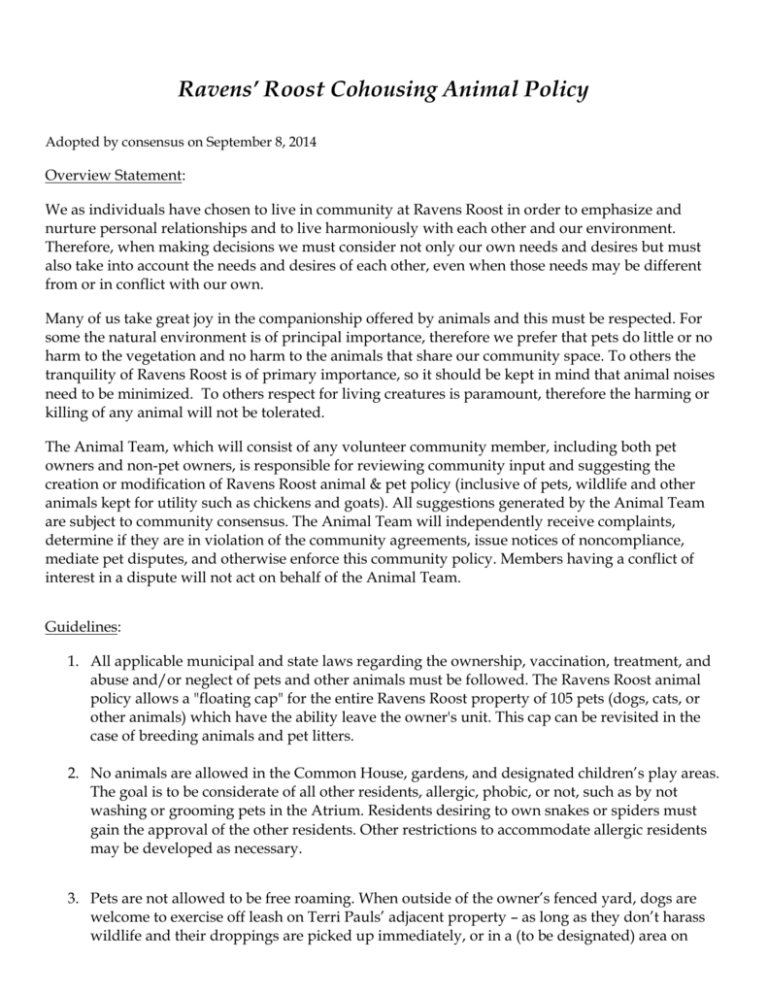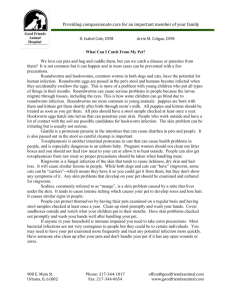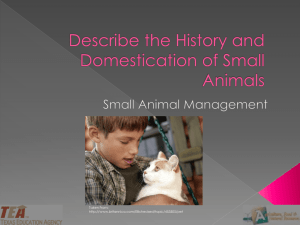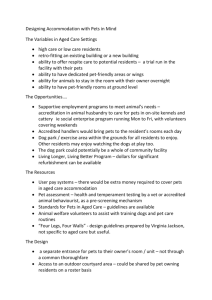Animal Policy - Ravens` Roost Cohousing
advertisement

Ravens’ Roost Cohousing Animal Policy Adopted by consensus on September 8, 2014 Overview Statement: We as individuals have chosen to live in community at Ravens Roost in order to emphasize and nurture personal relationships and to live harmoniously with each other and our environment. Therefore, when making decisions we must consider not only our own needs and desires but must also take into account the needs and desires of each other, even when those needs may be different from or in conflict with our own. Many of us take great joy in the companionship offered by animals and this must be respected. For some the natural environment is of principal importance, therefore we prefer that pets do little or no harm to the vegetation and no harm to the animals that share our community space. To others the tranquility of Ravens Roost is of primary importance, so it should be kept in mind that animal noises need to be minimized. To others respect for living creatures is paramount, therefore the harming or killing of any animal will not be tolerated. The Animal Team, which will consist of any volunteer community member, including both pet owners and non-pet owners, is responsible for reviewing community input and suggesting the creation or modification of Ravens Roost animal & pet policy (inclusive of pets, wildlife and other animals kept for utility such as chickens and goats). All suggestions generated by the Animal Team are subject to community consensus. The Animal Team will independently receive complaints, determine if they are in violation of the community agreements, issue notices of noncompliance, mediate pet disputes, and otherwise enforce this community policy. Members having a conflict of interest in a dispute will not act on behalf of the Animal Team. Guidelines: 1. All applicable municipal and state laws regarding the ownership, vaccination, treatment, and abuse and/or neglect of pets and other animals must be followed. The Ravens Roost animal policy allows a "floating cap" for the entire Ravens Roost property of 105 pets (dogs, cats, or other animals) which have the ability leave the owner's unit. This cap can be revisited in the case of breeding animals and pet litters. 2. No animals are allowed in the Common House, gardens, and designated children’s play areas. The goal is to be considerate of all other residents, allergic, phobic, or not, such as by not washing or grooming pets in the Atrium. Residents desiring to own snakes or spiders must gain the approval of the other residents. Other restrictions to accommodate allergic residents may be developed as necessary. 3. Pets are not allowed to be free roaming. When outside of the owner’s fenced yard, dogs are welcome to exercise off leash on Terri Pauls’ adjacent property – as long as they don’t harass wildlife and their droppings are picked up immediately, or in a (to be designated) area on Ravens Roost property. Outside of these designated areas, dogs must be accompanied by their owner or caretaker and be on a leash at all times. Standards on what constitutes voice control, and when pets may be under voice control only, may be defined and approved in the future by a proposal to the Animal Team. Such an addendum to this Animal Policy will be subject to Community consensus. 4. Cats are not allowed to be free-roaming. Cats can be in their owner's yard with containment measures such as those designed by our architect. Cats which occasionally escape from their owner’s units should be kindly corralled and returned to their owners. Cats who frequently escape will be considered to be in violation of this guideline. 5. No pet shall be allowed to become a nuisance or create any unreasonable disturbance. Examples of nuisance behavior are: a. Pets whose behavior causes personal injury or property damage. b. Pets which exhibit aggressive or other dangerous or potentially dangerous behavior. c. Pets which make noise continuously for a period of five minutes (see Anchorage Municipal Code Title 17.10.015). d. Pets which are conspicuously unclean or parasite infested. e. Pets which kill or injure other animals. 6. Residents are responsible for the pets of renters or guests who visit their unit; these pets are subject to the same restrictions as resident pets. 7. In designated back yards, all animal waste must be cleaned up by the owner. This may be addressed by criteria to be determined by the Animal Policy Committee. Outside of the owner’s unit or designated back yard, animal waste must be cleaned up immediately. Animal waste and litter should be bagged and placed in the garbage dumpster only. Cat litter may not be disposed of in toilets. 8. Pets at Ravens Roost are expected to be spayed or neutered unless there are medical, breeding, or other responsible reasons for them not to be. Owners desiring an exception to spaying or neutering are advised to contact the Animal Team. No pets in season are allowed in designated off leash areas. 9. All dogs and cats must be covered under their owner’s or caregiver’s homeowners’ or renters’ insurance policy or other liability insurance. 10. Some animals that are legal to purchase are acquired through illegal or unethical means. This is particularly true of tropical birds and saltwater fish and saltwater invertebrates. When choosing a pet, you are encouraged to consider the purchase of captive bred animals. Not only will this assist in protecting the natural environment, but you are also likely to get a healthier pet. Do your research and make informed choices. 11. Service animals, with certification from accredited organizations, are allowed to go anywhere their masters go. Therapy animals are treated like any other household pet. Policy Compliance/Enforcement 1. Most of the requirements of this policy reflect on the behavior of the pet owner/caregiver in the training and management of their pet. When the owner’s management of a pet’s behavior results in problems as described in this policy, the steps described in the paragraphs below indicate the process to be taken to resolve the issue and if possible, bring the pet’s behavior back into compliance with this policy. 2. Any resident observing an infraction of any of these rules is encouraged to discuss the infraction in a neighborly fashion with the pet caregiver/owner in an effort to secure voluntary compliance. 3. If the complaint is not resolved, the complaining resident and/or the pet caregiver/owner should bring it to the Animal Team. The Team may give verbal notice for the first violation, and a written notice for the second violation. If the problem persists, the Animal Team may mediate between the parties, or pursue further action. 4. If violations continue after two notices or mediation, the Core Group may require the permanent removal of the noncompliant animal. The Animal Team has jurisdiction to restrict problem animals to the owner's property, and to recommend to the Core Group that the animal be removed from Ravens Roost property. 5. At the Animal Team's discretion, immediate arrangements for a meeting of the Core Group may be made if the nature of the complaint involves injury or the imminent threat of injury to a person or animal, or the abuse or neglect of a pet. In the case of the imminent threat of injury to a person or animal, the Core Group may require the permanent removal of any pet. In that case, the pet caregiver/owner will have 3 days to remove the pet from Ravens Roost, and the pet must be restricted to the owner's unit or designated back yard in the interim. In the case of injury to a person, or the abuse, neglect or injury of a pet, the pet owner or the Animal Team will take immediate steps to correct the problem. 6. Note: While it would be desirable to treat all animals with the same respect, there are a few exceptions. Feral rats and wild mice are excluded from protection. However, we should attempt to eliminate anything that might attract them and only turn to extermination as a last resort. Bird feeders are allowed but must not become attractive nuisances; areas under bird feeders are to be kept clean and free of seeds/shells, and bird feeders must be moose, bear, and squirrel proof. 7. Residents wishing to own goats, chickens or other animals included under small animal husbandry (see Anchorage Municipal Code, 21.45.115) are requested to consult with the Animal Team regarding their proposed plan. The proposal should include who is responsible for their care in the owner's absence, and address any issues related to noise, smell, or waste disposal. Standards: The following Municipality of Anchorage standards apply to the outdoor keeping of all animals permitted: 1. On lots of 40,000 square feet or greater, structures for the outdoor keeping of animals shall not encroach into the setbacks of the zoning district and shall be at least 10 feet from any lot line. 2. The outdoor keeping of roosters, turkeys, guinea fowl, peacocks, or geese is prohibited. 3. Keeping up to 22 hens would be allowed on Ravens Roost property. 4. Goats: The Municipality of Anchorage regulates the keeping of small (or pygmy) goats under Ordinance AO 2011-50S, with the stipulations noted above (see Standards; #1). Goats larger than pygmy size are regulated under Section 21.05.070.12. Up to 3 goats may be maintained under this ordinance; their enclosure is to be placed 75 feet from any residence and 10 feet from any lot line.



